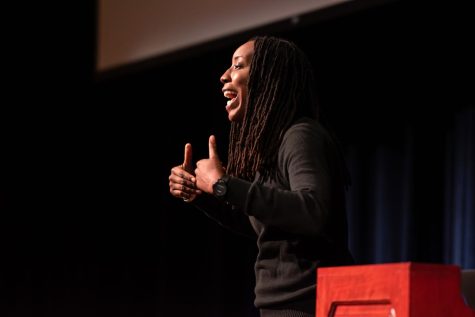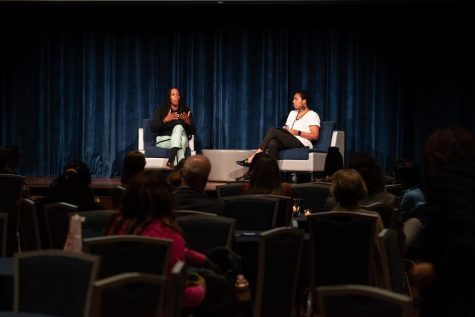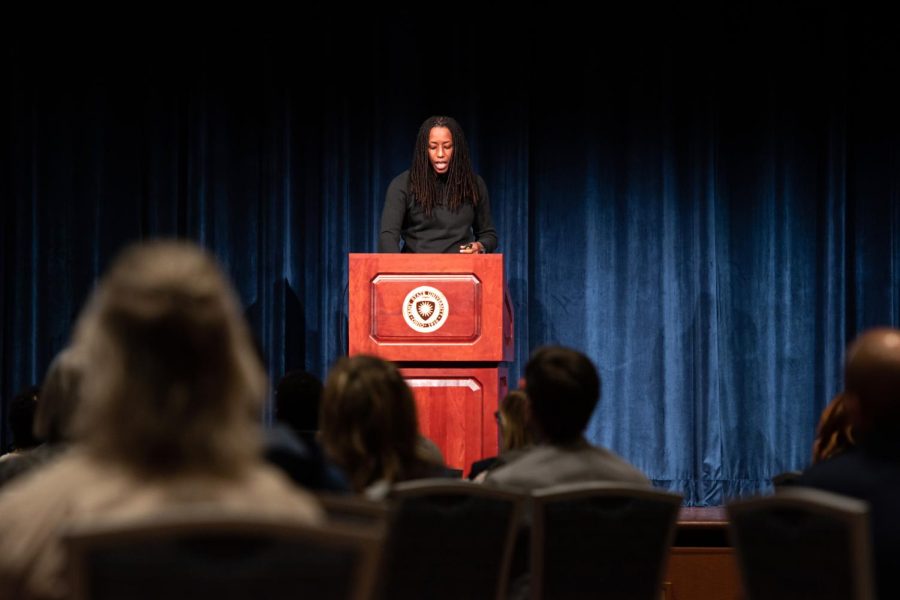Award-winning author talks abolitionist education and systemic inequality at Kent State anti-racism conference
Keynote speaker Bettina L. Love delivers an impassioned speech during the 2022 Anti-Racism Conference.
October 8, 2022
To conclude the first day of Kent State’s first Anti-Racism conference, award-winning writer Bettina Love discussed her work in education reform and its importance in altering the realities of systemic racism.
Deanna Baccus, president of Black United Students, introduced Love. Baccus said she was “over the moon” about Love’s inclusion in the conference and called it a “challenging treat.”
Love began with a quote from writer James Baldwin, or as she called him, “Uncle Jimmy,” from “A Talk To Teachers” from 1963. Baldwin said when attempting to change deeply entrenched attitudes and issues, there will always be pushback or opposition. This idea is one of the core principles of Love’s work and the baseline for her talk.
Love related Baldwin’s ideas to today. She said it is “revolution season,” meaning it’s time for action. While anti-racism work is not easy and will not make you friends, Love said, it is a sign of the work functioning correctly.

Love covered anti-Black bias within society, from the disproportionate impact on Black and Latino people during the height of the pandemic to medical discrimination and mistreatment. She focused on school-based mistreatment, since many of the values that make those systemic changes first sprout in schools.
She cited past events, like Ruby Bridges integrating Williams Frantz Elementary School in 1960, to show that school integration is not as removed from modern-day as some people like to think. She cited current events, including hair discrimination, school police officers attacking students, 4 12-year-old girls being strip-searched, and even a 6-year-old being zip-tied, arrested and pulled out of a school for having a temper tantrum.
“Curriculum is in the hand of white supremacy,” she said. “If they erase you [from it], they never have to apologize.”
There was one message Love wanted to make clear: if people want long-lasting change, the solution is to change the education system. Everybody has to be involved, she said. This is what Love calls “abolitionist education.”
Love said issues are entrenched within the values of school systems, no matter how many statements or promises for change. Love discussed that much of the focus on Black people and history in schools is focused on generational pain and suffering, despite the fact that this pain is often denied in our present day.
“How many stories of Black pain and suffering do you need to believe it exists?” Love said, silencing the room.
Love emphasized this type of anti-racism work is not radical.
“Being seen as a human isn’t radical,” Love said.
Love did not focus entirely on the negative perspective; she also highlighted the resilience and achievements of Black people. She showed Google’s 2020 Black History Video, stating it was not an endorsement of the company, which rippled applause throughout the room. Love reminded the audience that people made these creations with “racism and violence on our backs.”

Morgan Matis, an integrated sciences major, expressed admiration for Love’s talk.
“I thought it was fantastic,” she said. “I really thought it was moving. Her book goes way more into detail about it, but it was good hearing more of what she has to say impromptu kind of and just addressing a crowd.”
Charmaine Crawford, associate professor of Africana study, said she also cherished Love’s talk.
“I think she talked about so many things in terms of even how we think about allyship and coalitions,” she said. “Moving beyond just lip service but attempting to really kind of deal with some of the structural issues that plague this society.”
Crawford also ran a teach-in earlier the same day entitled, “Teach-In On Anti-Racism” with four other faculty members.
“Saying equal access is one thing,” Crawford said, “but really being dedicated to fairness and including people, their world views and perspectives into the whole is a different thing.”
Love closed her speech with a call for action before addressing questions from the audience.
She said the world needs more “co-conspirators,” people who want to make anti-racism a part of their everyday lives. She does not want this work to be viewed as purely destructive but as a culmination of efforts to create something beautiful.
“[This isn’t just] what we tear down but what we can build with love,” Love said.
Grace Davies is a reporter. Contact her at [email protected].

























